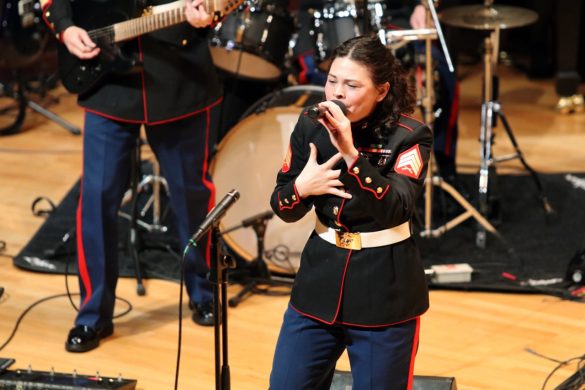One of the first things students do when they arrive on the University of Indianapolis campus is sign a contract that outlines rules and regulations that the students must abide by during their stay in the residence halls.Students also are given a planner with 54 pages of guidelines for student conduct. Students may rarely read those pages but are encouraged to do so.
Misconceptions exist about many of the disciplinary processes. Kristin Weeden, the associate dean of students, has one of the newer roles on campus. She deals with conduct issues that happen outside of the classroom.
While Weeden does not have to deal with many conduct issues, she does see some consistent issues.
“As a whole, we don’t have a huge conduct issue, to be quite honest,” Weeden said. “I will probably warn students against the freedoms of social media and how their communication on social media can reflect back on things that are going on on campus.”
Weeden said that most of the issues she deals with come from social media sites. Instead of directly posting to social media, she wants students to contact her office directly.
“Sometimes people go to social media to express frustrations with different things they may experience on campus,” Weeden said. “It’s important for students to know that our office is—specifically in terms of students affairs—here, so if someone has a concern about, say parking or dining hall service, they can come up here and express those concerns to see what we can do to meet their needs.”
Even though each situation is handled slightly differently, Weeden said the base of her job is to get an accurate story. When processing an incident, Weeden will bring in all parties who may be able to provide a piece of the story. Once all of the information is compiled, she decides what type of punishment or sanction is appropriate.
Once a decision is made, students have the right to appeal. According to Weeden, she makes sure to outline the appeals process when she gives students the paperwork that outlines their sanction.
“It’s nothing that we’re hiding. It’s their right to know,” Weeden said. “I want students to know the process. I want students to know what avenues there are that are available to them so they can utilize them. But students should take the initiative to know that on their own and that is why the [student] handbook is there. So not only does it have the policies, but their rights.”
Weeden strongly suggests that students take time to read their handbooks and the contracts handed to them at the beginning of the year in order to avoid conduct issues.
Weeden also trains residence directors in the various residence halls. Timeshia Keys is the RD for Roberts Hall and says even though she does not get many situations that come to her, she still trains her staff the same way.
“I think, for me, the biggest thing is always handling each situation as a separate or individual situation,” Keys said. “It’s never okay to go into a situation and automatically accuse someone of something. It is always important to get the entire story, or as much as you can. So that it is easy for me if I do have to intervene to make a judgment call based on all of the information, that is there.”
One of the things Keys also emphasizes to her staff is that they are not decision makers in the judiciary process. This is important to Weeden so that she can deal with issues as swiftly as possible.
“One of the things that we stress to them is that they are simply information gathers,” she said. “It is important for them to listen and to gather the information and get details that are true to the situations.”
Keys and Weeden both emphasize the educational part of the UIndy judiciary process, meaning that they both try to teach students about the incidents and why they were punished, instead of simply handing down a punishment. This part of the system is something UIndy Chief of Police David Selby always has enjoyed about the academic world.
“For us, law enforcement can mean [that] I catch you smoking marijuana [and] I can arrest you, or I could take you through the judicial system, or I could do both,” Selby said. “We typically go through the judicial system. That has always been the beauty of this job.”
UIndy campus police officers are fully vested police officers in the state of Indiana. Selby said this means that they have all of the capabilities that a sheriff’s office or city police force would have. They have a district set up around the school and follow the same guidelines as metro officers do. Selby said that his department does not have to get involved in residence hall incidents very often, but he wants students to know that his department can carry out the same procedures that apply in situations of probable cause and search warrants.
“You have to consider your dorm room like an apartment complex,” Selby said. “All of things that apply in the outside would apply here. The difference is that there’s a contractual relationship between the student and university. The students give up some rights because of that contractual relationship.”
Selby said most incidents are dealt with by the residence halls staff, which Keys said can sometimes cause tension.
“I think the biggest thing is realizing that the RAs or myself are not there to police you or to quote unquote ‘get you in trouble,’” Keys said. “I think that’s the biggest thing that students should understand about our job. We are there for a reason. We are also there to make sure that you will just enjoy your college experience.”
Weeden takes the time to explain and teach students about their actions. She said that the educational environment of a university makes dealing with incidents unique.
“Once you are out in the real world, no one is going to care to teach you or have that teachable moment,” she said. “While you are in an institution of education and higher learning, let’s do it now. That doesn’t mean that there won’t be moments where we will have to do some sanctioning and punishment in [a] traditional way, but even with that, it will always accompany a conversation.”









